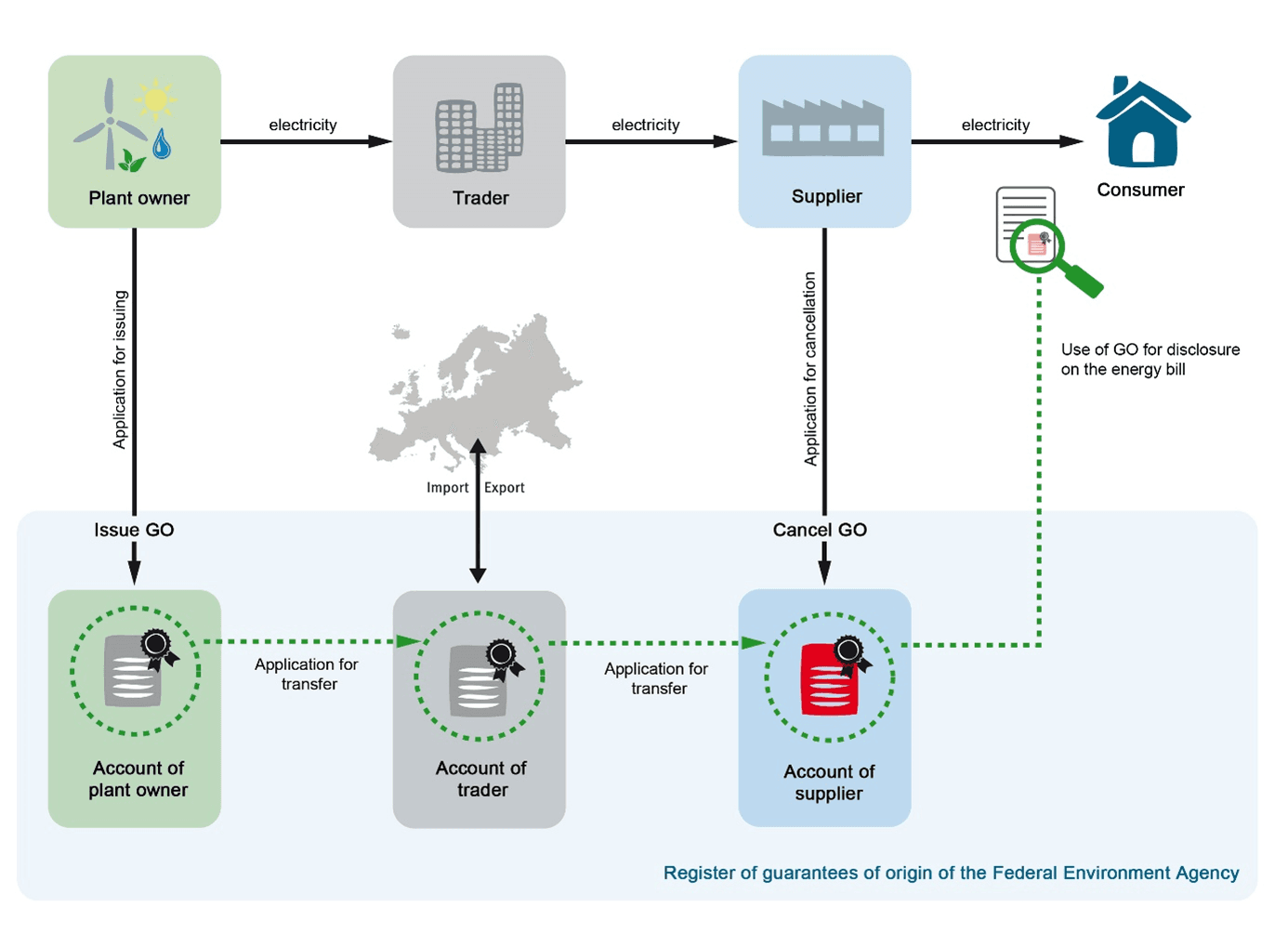13.09.2023 / 11:00
Guarantees of Origin Demystified – Part 3: The German Registry of GoOs, Herkunftsnachweisregister (HKNR)

In this third part of our series on Guarantees of Origin (GoOs), we are doing a deep dive into the German Registry of GoOs – the Herkuftsnachweisregister (HKNR).
In Germany, the Federal Environmental Agency (Umweltbundesamt, UBA) is responsible for implementing the GoO requirements stipulated EU Directives. The UBA has been member of the European Association of Issuing Bodies (AIB) since 2016, and operates the HKNR whereby it is responsible for issuing GoOs. The registration of a GoO issued within Germany in the HKNR prompts a notification to the AIB. This notification process is instrumental in fostering transparency in international GoO trade. The operation of the HKNR is regulated by Section 79 (4) of the Renewable Energy Act (EEG 2021) and the Renewable Energy Ordinance (EEV) of February 2015. In addition to these laws, is also the Guarantees of Origin Implementing Ordinance (HkRNDV) and Guarantees of Origin Fees Ordinance (HkRNGebV). Both ordinances entered into force on November 21, 2018, rendering previous ordinances obsolete.
The HKNR currently only issues GoOs for electricity – in December 2022 however, the German parliament however voted in favor establishing a registry of GoOs for gas, hydrogen, heating and cooling. The German government aims to have this legislation implemented by January 2024 (20/3870). Furthermore, a number of pilot projects for GoO registry for renewable energy carriers other than electricity are already underway.
Using the HKNR
Several industry players can register in the HKNR including renewable energy producers, energy traders, electricity retailers, service provider, and environmental verifiers. Only renewable energy producers, traders and electricity retailers are however entitled to accounts on the HKNR. This allows them to appoint external service providers to perform various functions on their behalf such as issuing and cancellation of GoOs, trading or account maintenance.
In Germany, only retailers (i.e. suppliers) are allowed to cancel GoOs – though in certain European countries, such as the Netherlands or Norway, cancelation is also possible by the end consumer. GoOs can be issued and traded between accounts up to 12 months following the production period, and must be canceled at the latest 18 months after production, following which GoOs are marked as expired. The UBA is not responsible for the collection and verification of measurements – this responsibility lies with the network operators.
The diagram below, which can also be found on the HKNR website, provides an overview of the use and transfer of GoOs in Germany.

The Double Marketing Ban
Importantly, in Germany, renewable energy generators are only able to register their facilities in the HKNR, granted they are not EEG-financed. For most other EU nations however, GoOs are allowed to be issued for subsidized RE generators.
This is due to Germany’s use of the Article 19 of Directive 2018/2001 (RED II), which is explicitly enacted in §80 of the EEG, as the ban on double marketing. The double marketing ban assumes that the green characteristics of renewable energy supported by the EEG subsidies, have already been paid for by the consumer, and as such should not be resold.
Accordingly, in terms of electricity labeling, all EEG-financed plants are marketed as grey electricity and the green features of such electricity are distributed to all payers of the EEG surcharge.
This requirement is discussed in some detail in our previous post on electricity labeling.
The double marketing ban severely limits the amount of green power that can be marketed in Germany and has been frequently criticized by analysts and policy makers. Looking forward, it is anticipated that as part of the European Green Deal, RED II will be revised whereby the issuance of GoOs to generators receiving subsidies cannot be declined by issuing bodies. The strengthening of European trade in GoOs is also mentioned in the coalition agreement of the current federal government in Germany.
Guarantees of Regional Origin
Finally, partly in response to difficulties associated with the double marketing ban, Germany has implemented a system for Guarantees of Regional Origin (GROs). A GRO is very similar to a GoO in that it is an electronic certificate that verifies the origin of electricity. GROs are however specifically focused on the regional origin of renewable electricity whereby one GRO represents 1 kWh. A supplier can purchase electricity and associated GROs for a customer if the customer lives within a 50km radius of the respective plant.
It is thereby anticipated that GROs may increase local acceptance of the Energy Transition by giving electricity consumers the ability to purchase electricity from renewable energy generators in their region.
As GROs are regionally focused, they are not internationally tradable as European GoOs.
Conclusion
In conclusion, the HKNR plays an important role in ensuring transparency and accountability for the issuance, trade and cancelation of GoOs in Germany. However, Germany’s unique double marketing ban, which restricts GoOs for EEG-financed renewable energy generators, has sparked debate and criticism. It is anticipated that changes to this policy may occur as part of the European Green Deal, promoting greater harmonization in GoO issuance across the European Union.
Overall, the German GoO system continues to evolve to meet the changing dynamics of the renewable energy landscape, aligning with broader European sustainability goals.
➡️ The next article in our series Guarantees of Origin Demystified will examine the trading of GoOs.
